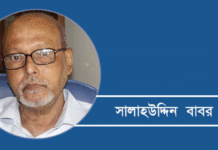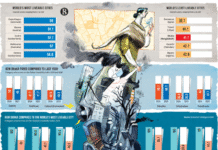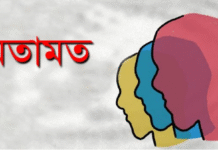Mumtaz Iqbal
The dialogue is between two former Bangladesh Presidents, Sheikh Mujibur Rahman (SMR) and Ziaur Rahman (ZR) on the historic Sujatha/Ershad conversation of 4 December, Dhaka and related matters courtesy of an ISI mole in RAW.
SMR: Well, Zia, what do you make of current Indian Foreign Secretary Sujatha’s chat with the virile evergreen Lothario ex-President Ershad?
ZR: I believe the chemistry was somewhat combustible but didn’t generate fireworks. But the conversation reminded me of Thucydides’ Melian Dialogue in his epic History of the Peloponnesian War Book V (85-113) 431 BC.
SMR: Really? And what’s that?
ZR: “The strong do as they can and the weak suffer what they must.” This is what imperial Athens told the defenceless people of the small island of Melos in the southern Aegean east of Sparta.
Chanykya’s arthashastra
SMR: Makes sense. But what we desperately need is a “Meyeli Dialogue” (talk between the women!). Anyway, Zia, I’m impressed by your knowledge of the Classics. How acquired?
ZR: Well, Bangabandhu, I had time on my hands at Tura in 1971 and brushed up on military history.
SMR: Very commendable. But I think your time would have been better used had you read Arthashastra by Chanukya (or Kautilya/Vishnu Gupta—take your pick). This makes Macchiavelli’s The Prince a kindegarden primer in how to win friends and influence people.
ZR: You are absolutely right, Bangabandhu. Sujatha’s conversation with Ershad was an extraordinary act of undisguised browbeating by the Chanakyapuri mandarine.
SMR: Quite so. But hats off to Ershad! He rebuffed Sujatha’s poisoned chalice and saved himself from being sigmatised as a 21st century Bangladeshi Mir Jafar or Vidkun Quisling. He even told Sujatha, like Susanah, not to cry for him for though he didn’t have a banjo made of willow, he had four licensed (!) pistols under his pillow!
ZR: Ershad is the ever gallant gentleman and budding poet. But, Bangabandhu, this must have left Sujatha fuming and bristling as her gunboat diplomacy didn’t produce the intended result, did it?
SMR: Well, Zia, that is how imperialists behave. They don’t give up easily. It’s not in their genes. We Bengalis had better get used to it. When you sup with the devil, having a long spoon doesn’t always help, does it?
ZR: Probably not. But why have we Bangladeshis been singled out for such an overabundance of the favours of imperialism?
SMR: Explain, Zia.
Perceptive observation
ZR: Till 1947, we were ruled by white imperialists; from 1947–71 by wheat coloured Sandhurst sahib imperialists; and from 1971 onwards by brown desi imperialists. The first two types could return to their own country. But geography means that we are perpetually stuck with the third. Familiarity breeds both resentment and contentment, doesn’t it?
SMR: You have a point there. We have experienced two colonial regimes, like the Quebecois (French and English). We have been colonised once by our own people, like the Irish were by the English. You now know why the English were successful colonisers: they perfected the technique of divide and rule in Ireland, with Cromwell leading the way using scorched earth tactics.
ZR: Perceptive observations, Bangabandhu. And how would you characterise the South Block imperialists?
SMR: Based on my pre-1947 and post-1971 experience, I believe there are various varieties. The first is the unreconsructed irredentist who fervently believes that 1947 shouldn’t have happened at all and must be reversed (Mother India or Bharat Mata syndrome). One of my associates recounted to me a chat he had in late December 1971 in Dhaka Hotel Intercon with the Amrita Bazaar Correspondent who gushed that 16 December heralded the rejoining of one of the two severed hand of Mother India! Now, remember, the correspondent is no jingoist or ignoramus. But he had unwittingly revealed his subconscious innermost thought that many erudite Indians feel or share.
ZR: Yes, I have come across this type fairly frequently though few were quite as frank as this newsman, preferring instead to talk gobbledygook of our common linguistic past and bright good secular neighbourly future.
SMR: The second type is the recidivist Chanukyite (Goa-constrictor or Sikkim, sock-it-to-them syndrome) who, ever mindful that Indian bayonets having liberated Dhaka—partially but not wholly correct—consider this gives Delhi the right—indeed the obligation—to determine regime composition and regime change in Bangladesh. Thus, Sujatha could tell Ershad point blank to support the Awami League, not because it is a paragon of democracy, secularism or good governance, but to stop India’s fevered favourite fundamentalist bogeyman Jamaat (read BNP) from coming to power. What gall!
ZR: An imperial Ashokan edict, if ever there was one. Any more types?
SMR: There is the third type who feels that normal inter-state relations should be maintained based on mutual interests but that Dhaka must always remain within, and never stray from, Delhi’s sphere of influence. The Teddy Roosevelt type: Talk softly but carry a big danda! (stick). Not for them the wussy Panchsheel—Five Principles of Peaceful Coexistence—adopted at the Bandung Asian-African Conference April 1955 that Nehru authored with Nasser and Sukarno. Is Panditji turning in his grave at the wholesale embrace and somewhat ham-handed application of Chanukya?
Toll of Hindutva bell
ZR: Enough classification of imperialists, Bangabandhu. You do Linnaeus proud. Is there any difference between these three species?
SMR: In form, yes, but not in substance. The first is unabashedly annexationist and would use force to reverse 1947 in a flash. The second is the Shogun puppet master, forever pulling strings from behind the curtain as in a Balinese puppet show. The third is the Sicilian godfather, who demands absolute obeisance, omerta (code of silence) and in return provides protection and patronage. The difference between the second and third categories is quite fine, like good-old Dhaka Muslin. However, this may vanish with the probable coming to power in Delhi next year of the Hindutva-oriented BJP with Narendra Modi as PM. Can Indian secularism survive the toll of the Hindutva bell?
ZR: If your analysis is correct, then it seems to me that all three varieties have this feature in common: that the Delhi/Dhaka relationship should be like a medieval lord/serf type but updated for selective 21st century sensitivities like secularism, protection of minorities, restraint on fundamentalism et al but ignore inconvenient things like sovereignty, mutual respect et al. Imperialism demands subservience, not independence. The latter must be crushed, if necessary with a strong hand. But how?
SMR: For a soldier, you are very perspicacious. I’m impressed.
ZR: Thank you, Bangabandhu. You are too kind.
SMR: To answer your question. Three models are available: Indonesia 1965 (elimination of PKI), Pakistan 1971 (crackdown on Awami League) and Algeria 1992 (extermination of Islamic Salvation Front).
ZR: But in each of three cases, the national army was the instrument of repression. You are not suggesting that our army will choose, or be persuaded by God knows who, to be such an instrument, especially when the issue at hand—how to hold elections—is nowhere near as existential as was made out to be in the three examples you cited. Political parties may be puppets of or beholden to outsiders like Ukraine President Yanukovych is to Moscow that is arousing considerable protests (Lenin’s statue was destroyed in Kiev!). But the army is generally not. If I know our jawans and officers, this is a role they will not relish but reject absolutely. The chain of command could splinter under this pressure. I wouldn’t be surprised if Kurmitola, like any good professional army, is burning the midnight oil preparing different contingency plans (creative and robust aid-to-civil (uncivil?) power?).
Fostering loyalists
SMR: I agree. The answer to this conundrum is to adopt a strategy of walking on two legs. The first and the more tricky part is to foster a series of “fifth columns” of loyalists in key institutions such as the bureaucracy, police, magistracy, political organisations such as youth fronts, media, cultural groups, NGOs et al. These entities align their interests, even possibly allegiance, through misplaced priorities or financial incentives with external forces, especially but not exclusively Delhi. The second is to create bogeymen galore through incessant propaganda such as shamelessly playing up the fundo threat and fomenting communal disturbances to destabilise law and order and create despondency. The framework sponsored and nurtured by Delhi in Bangladesh for some time has reared its ugly head and shown its fangs. But whether sufficient, substantial or efficacious progress has been made in making this framework invincible is not yet clear.
ZR: Bangabandhu, I’m reminded of the third partition of Poland in 1795 after Kosciuszko’s Uprising failed under which Russia, Prussia and Austria snuffed out the Polish nation and got an assembly (Sejm) of pliable and bribed nobles to ratify this dismemberment. If a sham election is held on 5 January in which most AL candidates get elected unopposed or after nominal opposition, what’s to prevent this National Assembly from inviting Indian troops to deal with the subsequent disorders that are bound to happen? Forgive me for raising the question, but who knows what secret understanding or protocol Hasina has reached or signed with her Delhi interlocutors?
SMR: As a Bangladeshi patriot, I would hope that nothing of this sort happens or that Hasina would stoop or be a willing party to such an arrangement. Whatever may be the motives of Chanakyites regarding Bangladesh, they are above all realists, I think, who know their Arthashastra. Every good strategist knows when its time to cut losses. Delhi would be doing itself and the AL a favour by taking away the spade to stop Hasina from further digging of the hole she’s in, and give her a ladder to get out of it. Having openly showed its partiality for the AL, Delhi by this very act has effectively sabotaged the party’s future, despite the millions it has funneled to its favourites and acolytes including the AL in Bangladesh. Cross-border currency flow is a big reason why the Taka has strengthened in the last few months despite record remittance inflows and reduced imports!
The last hope
ZR: Let’s hope you are right, Bangabandu. Otherwise, won’t your dream of Shonar Bangla go up in smoke or down the drain?
SMR: It may. But I see a silver lining in the efforts of you know who?
ZR: What do you mean?
SMR: I mean the UNO, Zia. It has a lot of experience in holding elections in different environments. It could be tasked to supervise the Bangladesh elections with the assistance of the armed forces, and even the Awami Leaguer and AL-appointed President as the commander-in-chief. This will require a constructive “Meyeli” dialogue under the looming shadow of possible Security Council intervention in favour of inclusive elections. If this escape route is adopted, it will show that the Bangladesh Forces can do peacekeeping at home when needed, like it did in 2009, just as well as they do abroad. This will protect their core corporate interests; enhance their goodwill amongst our peoples and maintain their access to UN peacekeeping missions, a lucrative source of income for the treasury and our servicemen.
ZR: Bangbandhu, an intriguing outside-the-box suggestion. Did you note that the international line-up reflects 1971? On one side are US/PRC/Pakistan/KSA+ EU—all for inclusive elections. On the other is India/AL—with Russia mum—for sham elections. The crucial difference is that the AL lacks popular support. But will the AL consider the UNO route? It means signing its death warrant, doesn’t it?
SMR: If the AL goes against the broad public interest, it’s finished anyway, just as the Muslim League was in 1954. But the AL is a resilient organisation. It lasted, survived and bested the martial laws of the Hazara Pathan Ayub and Qazilbash Afghan Yahya because it was aligned with the people and espoused pragmatic policies.
SMR (continuing): Like the Phoenix, the AL can rise again from the ashes. A spell in exile to cleanse its soul and body would be a long overdue catharsis and do it a world of good. Any army (Red Army, PLA et al) sometimes has to retreat to save itself to live and fight another day. Inflexibility combined with creative constitutional amendments invites public scorn, rejection and ultimately disaster. Who knows this better than me?
Source: Weekly Holiday









